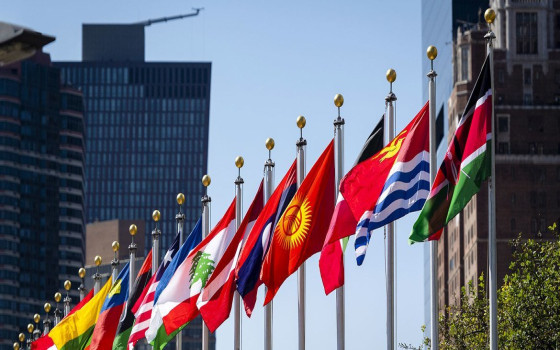Global Economic Prospects Deteriorate: Global Economic Growth Slows Due to Trade Tensions and Uncertainty

- Europe and Arabs
- Friday , 16 May 2025 9:49 AM GMT
New York: Europe and the Arabs
The United Nations said the global economy is at a "critical moment," predicting a further slowdown in economic growth this year, driven by escalating trade tensions and political uncertainty.
According to a new report issued by the United Nations Department of Economic and Social Affairs, the global economic outlook has deteriorated significantly since its original forecasts at the beginning of the year, according to the UN Daily News Bulletin, a copy of which we received.
The mid-year update of the "World Economic Situation and Prospects 2025" report indicated that sweeping tariff announcements by the United States and counter-announcements—including by China and the European Union—along with heightened political uncertainty, "have eroded global growth prospects," which were already weaker than the pre-COVID-19 trend due to high debt levels, slowing productivity growth, and geopolitical tensions. Global economic growth is now expected to slow to 2.4% in 2025, down from 2.9% in 2024 and 0.4 percentage points lower than the January forecast.
The UN predicted that this slowdown would affect both developed and developing economies. The report found that weak global trade growth and investment flows are exacerbating the slowdown, and that many trade-dependent developing countries face increasing challenges from declining exports and commodity prices, tightening financial conditions, and rising debt burdens.
Least Developed Countries
Speaking to reporters in New York, Shantanu Mukherjee, Director of the Economic Analysis and Policy Division at the Department of Economic and Social Affairs, said that the January forecast had been for stable, albeit subpar, growth over the next two years, but that expectations have since deteriorated, “accompanied by significant volatility across various dimensions.” He stressed that the least developed countries (LDCs) will be the hardest hit, with their 2025 growth forecast lowered from 4.6% to 4.1%.
He added: "This translates into billions of dollars in lost economic output for the most disadvantaged countries. LDCs are home to more than half of the world's population living in extreme poverty, and they are the only group of countries that already has a growth target in the 2030 Agenda (for Sustainable Development). They have been struggling with extremely difficult conditions for some time."
The report concluded that the deteriorating economic outlook undermines progress towards the Sustainable Development Goals, many of which are already off track.
It stated that small and vulnerable economies, with limited bargaining power in bilateral trade negotiations, face declining trade revenues, weak job creation, and slowing growth, which threatens to widen global inequalities and hinder economic convergence.
He added that weak growth prospects limit governments' fiscal space and constrain investment in development and climate action. Unclear Trade Policies
For his part, Ingo Peterl, Chief Economic Officer, said that the lack of clarity on trade policies and their implications makes it difficult for businesses around the world to plan and invest with confidence, and also complicates monetary policymaking.
He said that recent progress in easing trade tensions, including the interim agreement reached last weekend between the United States and China, is a step forward, but estimates indicate that the effective US tariff rate remains high at around 14%, “six times its level at the beginning of the year.”
He added: “Overall, we expect global trade growth to slow sharply to 1.6% in 2025. This is about half the rate recorded last year.”
Reasons for positivity
Despite this, Mr. Mukherjee noted that there are reasons for positivity. He said that UN forecasts since the beginning of the year indicate that the global economy has been “reasonably healthy.” He added that while global growth has declined, it is not as severe as other recent shocks, such as the global financial crisis. He said that expectations indicate that bilateral negotiations will lead to a reduction in tariff levels, "although they will not return to pre-February levels." However, he emphasized that an early and complete resolution of the uncertainty will help individuals and businesses advance economic decision-making, which will have positive outcomes for this year and greater impacts on the economic outlook for 2026.
For his part, Mr. Peterl noted that, in addition to the immediate impacts, new developments "could accelerate several structural shifts in global trade," including the growing importance of services, changes in the structure of supply chains, the adoption of advanced technologies, "as well as the gradual shift to a more multipolar global economy."
He added, "It is clear that we are entering a transitional phase that will bring both challenges and opportunities to the global economy."
Mr. Mukherjee noted that there is growing momentum among countries to build "diverse economies with different dimensions," and that this outcome, in the medium and long term, "will enhance everyone's resilience and open up new horizons."














No Comments Found